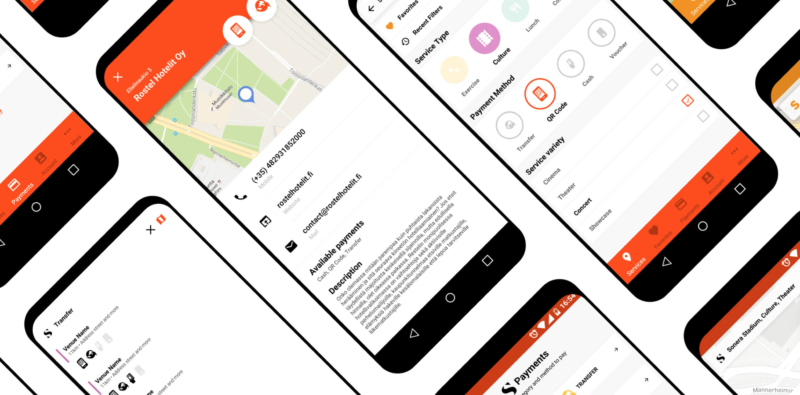18 December 2020
Here are 5 questions you should ask yourself when looking for a software development partner

This article is for you if you: a) are a manager in a software company; b) have an internal team of developers; c) recently started thinking about outsourcing a new software project or a part of it. Of course, you have a few questions you want to ask potential partners – to choose the one that fits your needs. That’s alright but I believe that you should start with asking a few questions YOURSELF.
The two most basic factors to consider before choosing a partner to outsource software development are: vendor’s reputation (such as Clutch ranking, reviews and testimonials) and project’s cost (in other words – which vendor will deliver me a product I need, the way I want, in a price I can afford). However, if you’re a manager in IT, you know that there are also some less obvious, yet equally important subjects to think about. Here’s a list of questions that should inspire you to think about these elusive subjects.
“Who do I want to work with?”
There are many vendors on the market and when you’re looking for an outsourcing partner you pretty often get tangled up in their portfolios, client reviews, testimonials, company profiles, etc. It’s all good but quite often you may forget that, first and foremost, these companies are built of people.
So, let’s start from the top – find out who owns the company that captured your interest. If it’s possible, it would be great to meet the owners in person (or using Zoom) – talk to them not only about business but also about some trivia. It can help you better understand who they are as people. It’s often a carbon copy of the company’s culture.
Besides the owner, it’s good to ask about developers and – especially if you’re a CTO – to have a chat with some of them. Why do they want to work for this company in the first place? What are their favourite kind of software projects to code? Do they have a possibility to sharpen their skills? How does the company take care of employees to keep them for longer?
After talking with the owners and the devs, you should get a pretty good answer for one of the most important questions – “are these the people that I’d like to work with?”
Especially, if you’re looking not for a simple remote contractor but for a long-term software partner.

“Do I just need them to deliver me a product or do I want to work on the solution together with them?”
This question is really important and should be asked at the very beginning of your research. It’s possible that you need the remote vendor to just provide you with a finished software product and you don’t really want to participate in the whole development process.
But if you’re a manager in a software company yourself, the situation is probably different. Then, you know that software is a backbone of your whole business and you need to make sure that every piece of it – also the ones developed by remote vendors – are exactly what you need. And to do that you gotta roll up your sleeves and get your hands dirty.
See also: IT outsourcing services in 2020: Five real-life scenarios for you and your company
At The Software House we’ve got a pretty long history of working with CTOs from other companies, so I approached Marcin Mazurek, our Sales Director, to comment on this topic. And he provided me with a great metaphor:
“Sometimes, sales people compare software outsourcing to buying a new car. Well, in many cases, when you need proper custom software development, it’s nothing like buying a new car. It’s rather about building this car together with your partner.”
And you know what’s the best? That such a collaboration is beneficial for both parties. So, if you are looking for a long-term partner and you make it clear at the beginning, the selected vendor will do their best to meet your expectations – as they care about long-term partnerships too.
🔥 Are you the tech manager who likes to get straight to the point? Well, we’ve been named the best custom software development company in Poland so if you’re looking for a technological partner, let’s just schedule free software consultations.
”Is their development process compatible with mine?”
This question has two faces. If you want to outsource the whole new project to the vendor, the development process is probably a secondary issue. Of course, it’s good to ask, for example, what would be your role in this process and how much time it will require from you. But, at the end of the day, it’s mostly a matter of assessing if their process sounds valid and leaving them the responsibility for coordinating the whole thing. Really, it’s good to trust your selected vendor if their process proved successful in the past.
However, the situation changes if you need to outsource a few developers from the vendor to extend your existing team. Then, it’s crucial to talk about the process and to make sure that you understand it the same way. Marcin Mazurek explains that you should approach this subject with honesty:
“Don’t kid yourself – it’s almost certain that there will be some differences between the way you and the vendor work. What’s important is to talk about these differences and to agree on something that both parties are comfortable with.”
When you’re asking about the process and you hear a simple “we work in Agile” or “we use Scrum on a daily basis”, don’t stop at this point and make sure to ask some detailed questions about it: What’s the schedule of your project meetings (Scrum artifacts)? What are the responsibilities of every team member? Who’s taking care of quality assurance? Who’s responsible for preparing documentation? What’s my role, as the client, in this process?
Exchanging such know-how with the vendor – especially when we’re talking about a long-term partner – means one very important thing: you can use some of their experience to improve your existing processes. It’s clearly a win-win situation.
Oh, and on a side note: when it comes to discussing the collaboration, it’s also good to think about your in-house team. Wouldn’t it be a problem for them when you start outsourcing some development to a remote team? It’s very important to get your in-house devs ready for such a collaboration. We know that problem very well and I advise you to check out our article on preparing your in-house team before outsourcing.
But now, let’s talk about money.
🚀 Are you a tech manager in need of talented engineers?
We’re here to extend your development – in weeks, not months. Schedule free software consultations.
“Do I really know what I’m about to pay for?”
How should you approach the subject of development costs? Normally, you would probably get an Excel file, list a few partners you consider and compare the data about them – costs included (maybe even underlined). It’s a good starting point indeed. But analysing raw numbers won’t give you a broader overview of the future cooperation – especially if you’re looking for a long-term partner. Let us consider two scenarios.
The first one is more obvious: let’s say you’re looking for a remote company that will create your project from scratch. One vendor says they can deliver a product you need for $100k, the other promises to do “the same” for $90k. I guess you know by now that it’s not about simple maths and comparing these offers by looking at the numbers only will be very misleading – both estimations are most likely based on slightly different lists of features, team composition, devs seniority and probably a different understanding of what the feature description really means, etc. That was the easier example.
The second scenario is less obvious: you need to outsource a few developers to extend your in-house team. What do you do? Of course, you compare hourly rates. Well, that may be misleading as well. Don’t let the feeling of paying $40 per hour over $45 per hour make you choose the first vendor straight away. Why? Because, yet again, it’s worth exploring what exactly is behind that stake, asking yourself (and your vendor) “what am I actually paying for?”. I approached Marcin Mazurek to explain what’s behind the numbers:
“The truth is that in Western countries we’re lacking software developers. Good devs know that very well and value themselves highly. So, when you see that some company is leasing their engineers for a price lower than others, you know that something’s missing here. That ‘something’ being probably the actual experience of these devs, as well as the company’s will to invest in improving their skills.”
Of course, don’t believe that higher rates always mean higher quality. Approach the vendor and try to find out if this additional money goes straight to the pocket of this company’s owners or if they invest great sums in the development of their employees. Do they organise internal and external training for their people? Or maybe some of their employees are encouraged to become guest speakers at software development events? Do they have their own Research & Development department where the developers can work on new components and boilerplates (which, then, thay can use to lift off with the development of your app quicker)?
Try to gather as much information about what you get for that price as possible. Especially if you’re looking for a long-term development partner.

“How will we handle setbacks and problems?”
The last topic on our list is a tricky one. Let’s be honest and realistic – every software development project faces some problems at some point. It’s inevitable. And the way the vendor of your choice resolves any setbacks may be crucial for your collaboration. That’s why you should ask your potential partner for real-life examples of how they solved such problems in the past.
It’s good to discuss actual scenarios that may happen during your collaboration. What if two development teams – your in-house team and the remote folks – will find it difficult to cooperate? How to solve that? What if the project you have for the vendor is based on legacy code (which, as we know, developers simply hate)? How will your partner-to-be approach this situation and make sure that their team stays motivated?
These questions are based on some real-life experiences we had at The Software House. If you’re willing to hear more about how we solved these problems, we’d be more than happy to discuss them further with you.
See also: Software companies in Poland: 2020 outsourcing guide for CTOs
Summary
Summing up, it’s important to not only ask a possible vendor a bunch of questions but also to answer a few questions on your own. Find out what you really need and what kind of people you’d like to work with on this task.
It’s super important to feel good with your chosen partner in the first place. You can have different approaches, but it’s valuable to understand those differences. Therefore, invest some time to meet not only the salespeople but also their CTO or managers of departments. And to discuss more topics than just straight business-related questions.
At The Software House, we really like to cooperate with tech managers and software companies. If any more questions appear after reading this article – feel free to contact us. and let us know what you expect your next big project to be. We’ll be more than happy to discuss your ideas and, who knows, maybe it will be an exciting start of a long and successful journey for us both?

